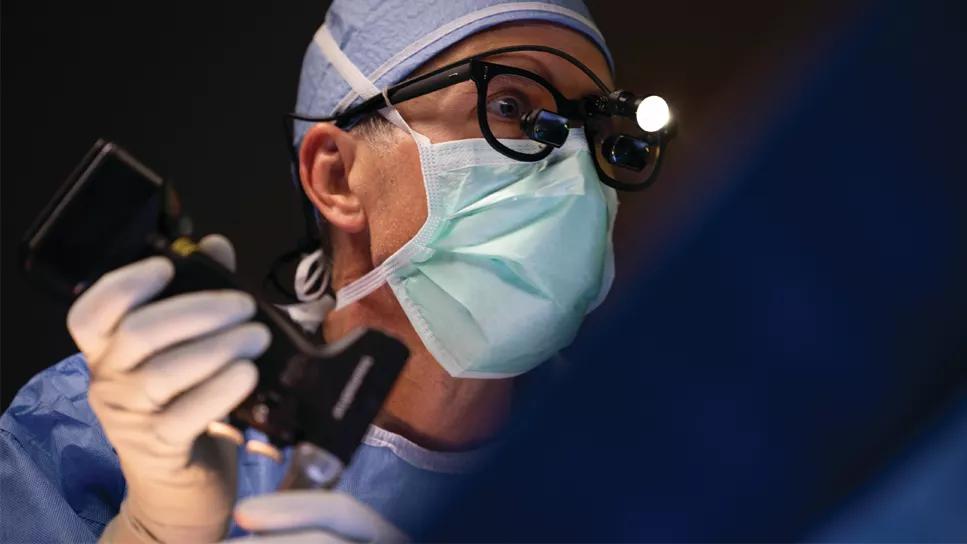Scientific program chair reflects on what may resonate longest from this year’s neurosurgery conference

Image content: This image is available to view online.
View image online (https://assets.clevelandclinic.org/transform/3a221db6-f453-4817-9af4-c2cb0e98bb25/minimally-invasive-spine-surgery-steinmetz)
neurosurgeon performing minimally invasive spine operation
“If you ask me a few months from now what I remember about AANS 2024, I think three things are most likely to endure: MMA embolization for subdural hematoma, the prominence of artificial intelligence and how the ‘what matters’ theme infused much of the meeting,” says Michael Steinmetz, MD, Chair of the Department of Neurosurgery at Cleveland Clinic.
Advertisement
Cleveland Clinic is a non-profit academic medical center. Advertising on our site helps support our mission. We do not endorse non-Cleveland Clinic products or services. Policy
As chair of the scientific program subcommittee for AANS 2024 — i.e., the 2024 American Association of Neurological Surgeons (AANS) Annual Scientific Meeting, held in Chicago May 3-6 — Dr. Steinmetz is in a good position to judge. He says that while the meeting included its usual share of solid scientific presentations, insightful procedural demonstrations and intriguing abstracts, many were primarily of subspecialty interest.
When asked by Consult QD to name three top takeaways from the meeting, he focused on matters of broad relevance to the neurosurgery community. His reflections are recapped below.
“Middle meningeal artery (MMA) embolization with liquid agents is about to revolutionize the treatment of nonacute subdural hematoma based on favorable results of three clinical trials — EMBOLISE, MAGIC-MT and STEM,” says Dr. Steinmetz.
While new results from these randomized trials were not presented at AANS — preliminary findings from all were presented at the 2024 International Stroke Conference in February — an assessment of these studies figured prominently in the “What Matters 2024: Cerebrovascular” plenary by Elad Levy, MD, MBA, of the University of Buffalo. And there was much buzz around this endovascular approach to subdural hematoma throughout AANS 2024.
“This is really significant because subdural hematoma is a common condition in our field — almost all neurosurgeons see it unless they’re highly subspecialized,” Dr. Steinmetz explains. It has traditionally been treated either with surgical drainage, through a burr hole or small craniotomy, or medically. Medical treatments are not very effective, and surgical treatment has been marked by high rates of recurrence.
Advertisement
In the three new randomized controlled trials, MMA embolization was studied both alone and as an adjunct to surgery, depending on the trial and the cohort, and was compared to either surgery alone or to observation or medical therapy. In all three trials, MMA embolization showed significant reductions in hematoma recurrence or progression through follow-up of three to six months. The degree of benefit generally was greatest among patients not also treated with surgical drainage. Analysis of other endpoints is ongoing, and full results have yet to be published, but there is wide consensus that MMA embolization will be the new standard of care for nonacute subdural hematoma.
“We’re taking a common condition that typically has been treated surgically and treating it less invasively with an endovascular procedure, and we’re achieving lower rates of recurrence with good safety,” Dr. Steinmetz says. “This is a game changer for an important part of neurosurgical practice.”
The theme of AANS 2024 — “what matters” — was far more significant and substantive than most meeting themes ever are, Dr. Steinmetz says.
“The AANS president conceived this theme in view of the extraordinary degree of change our society is experiencing across multiple fronts — socially, culturally, scientifically, technologically,” he explains. “The aim was to embed neurosurgery in a broader societal context throughout the meeting in a way never attempted before, with the aim of exploring what really matters to our specialty and the ways in which contemporary neurosurgery matters to society and how it could matter more in the future.”
Advertisement
The aim was to infuse the theme throughout the meeting, most visibly in a lineup of invited speakers addressing issues of broad significance and in plenaries by recognized thought leaders in neurosurgery who each took a “what matters” approach to their subspecialty area, from neurotrauma to spine surgery to pediatric neurosurgery. When Dr. Elad Levy spoke to the significance of MMA embolization for subdural hematoma, as noted above, it was part of his “What Matters 2024: Cerebrovascular” plenary address, which focused on big-picture impacts of developments in his field.
“The plenaries all gave broad perspectives on the evolution of our various subspecialties, what matters in them now and where the subspecialties are headed,” Dr. Steinmetz says. “It was an intentional and notable focus on the relevance and impact of our work in the wider world. It’s a new emphasis from AANS that’s worth watching moving forward.”
Perhaps the most prominent of all the change factors shaping society today is artificial intelligence (AI). In response to AI’s rise and reach, AANS for the first time offered an “Immersion Experience in AI” at one of its major meetings. Members had multiple opportunities throughout the program, starting with the opening reception, to interface with AI applications and discuss their potential implications.
Among the highlights:
Advertisement
“We embedded AI throughout this meeting because we believe it has a key role in the future of neurosurgery,” Dr. Steinmetz says. “Neurosurgeons can likely expect more of this type of AI immersion from AANS in meetings to come.”
Advertisement
Advertisement
Today’s research helps illuminate tomorrow’s needs
Novel ‘assessment center’ will be a partner in care by serving as an engine of structured data collection
What it’s like working in neurology critical care and what to consider before entering the specialty
Case series links catastrophic outcomes to therapy initiation within 48 hours post-procedure
New study highlights the need for plain-language prompting and human oversight in addiction care communication
Aim is for use with clinician oversight to make screening safer and more efficient
Automating routine medical coding tasks removes unnecessary barriers
Add AI to the list of tools expected to advance care for pain patients